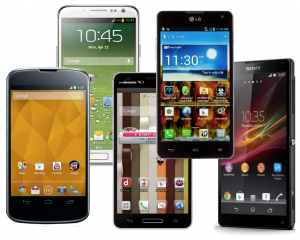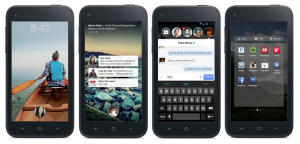
A couple of days ago, Mark Zuckerberg announced the new Facebook Home. Rather than the speculated new phone from Facebook, it’s instead, a new “home” screen of the Android phone. Or, put differently, an Android Facebook “skin”. Wired went as far as to refer to this as Zuck’s Android Takeover.
Facebook Home has vividly demonstrated that the Android ecosystem has been a double-edged sword, both for the handset manufacturers that are on the Android bandwagon, and to a lesser extent, to the mobile telecom operators.
Why?
Well, both the operators and the handset manufacturers don’t just want to sell handsets or acquire more customers. They want to get their customers to buy and use additional products and services. They want to cultivate a longer-term relationship with their customers. They want to be able to offer customers a unique experiences. All this could be done with features/functions of the smartphone itself or through unique services offered. Facebook Home limits their abilities to make this happen.
Android has benefited Manufacturers thus far…
Android has allowed manufacturers to focus on the hardware and drive it forward aggressively. Android also fostered a huge number of applications compatible with their devices, which have benefited users. Manufacturers, still needed to spend resources thinking about how to differentiate.
For operators, it allowed them to (reluctantly) remember what they do best – and that’s not to specify phone features and capabilities, but rather to operate a large telecom network and all associated aspects (retail, support, and more). However, operators too need to constantly differentiate in terms of the end-user experience of their services.
Innovation is required
What does every company need to do in order to survive and thrive? It needs to innovate. And, to innovate means to differentiate their products/services from those of the competition. For operators and manufacturers, this means different things. However, being able to have apps and “front ends” integrated into the phone, was one of the key methods both of these categories of players sought to use for differentiation.
For an operator, an example of this might have been some VOD application just for their subscribers or something to integrate another service in their portfolio (e.g. TV). For a manufacturer, this might have meant a slick alternative to the default Android front end. Both of them might have liked to “skin” Android to be unique to them, and some did try to do so to varying degrees of success.
One might think that smartphone manufacturers can differentiate based on hardware features, for example:
- Screen quality (size, resolution, brightness).
- Camera quality (resolution, low-light, etc.).
- Speed (processor+).
- Connectivity (networking, Bluetooth, NFC, and more).
- Capacity (storage, memory).
- Sensors and UX operation (hand waving, gyros, accelerometers, etc.).
- Environmental resistance (water/dust resistance).
- Dimensions (weight, width, screen size).
- Battery life.
While this seems like a long list of features, providing plenty of opportunity to differentiate, it isn’t so. Soon, all manufacturers will be so good, that differentiating on these parameters simply won’t be enough. All devices will be similarly “amazing”. Manufacturers wanted to “own” the device home screen!
Shelly Palmer, in his review of the Samsung Galaxy S-IV put it nicely:
Since everyone who isn’t Apple is using Android, it’s going to be hard for any manufacturer to create a true stand out device. The phone and tablet business feels a lot like the PC business did in the Wintel era – lots of undifferentiated hardware running the same software. But Samsung has the right idea – separate the features of the hardware (which everyone can OEM) and concentrate on the benefits of the software (which can, in some cases, be proprietary).
Then, Facebook Home Came Along
And it is claiming that one piece of vital real estate – the home screen of the phone. If users embrace Facebook Home, it would mean that neither the manufacturers nor the operators would have much ability for differentiation.
And there lies the risk of Android (the double-edged sword). By buying into Android, anybody could have come along, at any time, and snatch this precious real estate. As long as it was very fragmented and only a tiny fraction of users replaced their smartphone’s default experience, the risk was contained. But when someone like Facebook comes along and offers an alternative, it could really eat into their ability to differentiate.
If I were in Samsung, HTC, LG, AT&T, Verizon, Orange, or Vodafone, I’d be wishing Facebook Home would not stick with users… Thankfully, I’m not :-)…
So, what does Google think about this?
Well, this post couldn’t end without thinking about Google’s perspective. I seriously doubt Google are happy about this (as also sensed from their “reactions”). After all, Google wanted this same real estate to get eyeballs to their own services. That was almost the whole point behind Android to begin with… So Google too, will probably be hoping Facebook Home doesn’t succeed.
Would love to hear your thoughts.


Tal
There is always a delta between the press release and the actual user experience.
1) The user experience doesn’t stack up to the press conference smoke and mirrors
Go ahead and install Facebook Home – you will see it’s no great shakes as a launcher. You’ll be back to Go Launcher in no time.
2) Believe it or not – most Android users do other things besides looking at their Facebook feed. Having a FB feed in your face instead of WhatsApp, Gmail or Music is a PITA
This leads me to believe that it will have a modest PR upside for FB and little to no downside for Google Mobile search/ads.
Danny
Tal, great post as always!
I think Google was caught by surprise by Facebook’s strategy and will have to mount a response. Their primary reason for giving Android away for free is that with every new user activation they can get the mobile searches and associated revenue scale up.
Once FB declared that it will make the machine made information indexing obsolete and replace it with man-made indexes (your friends likes and shares) Google has been on high alert. Whether or not the one form of information retrieval is better than the other is an open question .(who sais that my cousin’s likes on FB for articles on organic food are than the top-search results that Google today generats based on > 250 signals per information unit) But Google is carefully watching for signs that people are now starting to browse the web more based on their following of friends posts and less on Google searches.
The trends is very alarming for Google. FB is now the most used “browser” in the world. Users spend more time with it than with any browser.
Will they soon perform more searches inside FB including for things they want to buy?
If yes, and Fb thinks so, then having a FB front-end experience on the Android phones deprives Google of a mobile monetization strategy.
What I especially like in FB’s take on the phone personalization is that they did not produce an Android fork, or a phone -> which would have minimized user acquisition for FB home, but rather made it into downloadable thing that everyone can install on their own on any existing Android phone.
I am extremely curious to see if FB home will take off with users, and if yes, what will Google do to stop and reverse the trend. Will they release an Android version that comes with a Google Now front-end experience that searched in FB and in Google better than FB searches in FB?
I bet they will have to.
Stoyan
Danny, might be poor experience, but for teens and young adults, for which Facebook is an important part of their lives, I think this will have impact. They are also the most capable of trying this out. And they’re a very important segment of the user-base.
Stoyan, thanks! Don’t know how surprised Google was. Unhappy, almost for sure. I am still very skeptical about Facebook’s ability to succeed with search vs. Google. Even by the virtue of integrating the social graph. However, overtaking the front-end could give them the ability to mediate, even the search… (partner with Bing for back-end search, etc.).
I think Google might choose to take a more aggressive approach here. For instance, changing the front-end radically and often enough so that it would be difficult for others to “hang on” to any front-end traction they gain.
> I think Google might choose to take a more aggressive approach here. For instance, changing the front-end radically and often enough so that it would be difficult for others to “hang on” to any front-end traction they gain.
I find some irony here in that Google has been driving the net neutrality bus, and so it seems what goes around has come back in the form of home screen/search engine neutrality. It also seems that Google is stuck because to the extent that they undermine the FB front-end, then FB will go the device route.
I think of so many folks (my wife, for example) who use their phone solely for FB — with text, email and voice as convenience apps. I think it will be fun to watch this play out.
– Matt.
Tal,
You are point on – Android is being threatened by those who wish to skin it – you can call Amazon’s Kindle tablets a skinning on Android as well – and the Chinese’ own version of Android the same.
That said, I think that’s Google’s price of making business. They couldn’t build such an ecosystem without sacrificing their OS as open source – and open it to the extreme in the process.
They probably expected such attempts from competitors of different kinds – I am not sure they accounted for Amazon and Facebook to do it…
Google will need to step up their innovation, which at the end of the day is a good thing for consumers.
Tsahi
Matt, indeed, ironic. Absolutely agree.
Tsahi, you are probably right. They anticipated skinning. I think they were primarily thinking of the device manufacturers and operators. Amazon certainly was a first awakening, but they realized that Amazon had a limited reach, after all, they would never be on more than 25% of the devices. Facebook, as a global, huge reach, pure net player, is yet another matter. I think this is the biggest risk to-date on the benefit Google can hope to achieve with Android.
Someone told me last night, but wait, the fact that Facebook has a skinned front end – why does it have such an impact, even if everybody adopt it. After all, they still have search, maps, gmail, etc… well – who says people continue to use Google’s search, maps, or gmail once Facebook takes over the lockscreen. They can replace the search with their own or Bing, they can incorporate a competing maps. Mail? Of course they could help there…